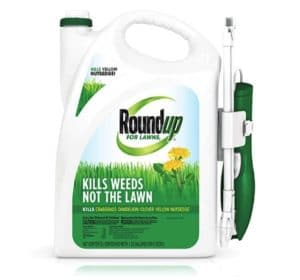Roundup is an herbicide you can use to kill weeds on your lawn. It is very effective, but there are some necessary precautions to follow if you use it. This article will explain why you should avoid using Roundup on grass and what steps you should take if it accidentally gets on your lawn. Will grass grow back after Roundup?
Do Not Use Roundup Near Grass Because It Will Likely Kill It

Roundup is a non-selective herbicide, which means it kills all plants. Avoid using it near grass because it can kill your grass, in addition to killing weeds. Many people also use Roundup on their lawns to kill weeds and other unwanted plants, killing even the good plants in your yard.
Other Roundup options are available that target broad-leaf plants. These safer options are less likely to kill grass and may be a better option for killing weeds on lawns.
Early Prevention for Accidental Spraying of Roundup on the Grass

If you believe that Roundup accidentally got on some grass, it’s paramount to keep the grass as healthy as possible so it can grow back quickly. One way to do this is using fertilizers made from natural materials instead of chemicals. This will help your grass build up its defenses against pests, which will help prevent problems in the future.
Another good way to prevent future damage is by watering your lawn regularly and deeply—this helps keep moisture in the ground where it belongs, not evaporating into thin air.
Reviving Your Dead Lawn Due to the Effect of Roundup
If you are trying to prevent a late-season Roundup application from killing your grass, then you will want to wait at least two weeks after the application before removing any dead grass. This will give the herbicide time to work its way into the soil, where it will be less likely to harm any remaining plants.
Using a sod cutter or lawn mower can help in this process by exposing more of the soil and killing off any remaining dead grass. You can also use a rake if you prefer, but be sure not to disturb too much of your existing lawn if possible so as not to spread any remaining Roundup onto other parts.
Finally, using a dethatcher on areas where no new growth has come up will help ensure that there aren’t any surprises when spring rolls around again.
Follow Instructions To Avoid Killing Grass
One of the most common questions is, will grass grow back after Roundup? The short answer is yes. If you follow all instructions on the label and use it properly, Roundup will not kill grass you do not want to remove
In order for Roundup to be effective against unwanted plants, it must be used at full strength and applied when there are no leaves on them (or when they are actively growing). You must also ensure that there is no rain 24 hours after application, or it will wash off before taking effect.
If you have no more use for roundup, here’s how to dispose of it properly.
Conclusion
Roundup can be used safely on your lawn if you follow the instructions. It is a powerful herbicide, but with the correct precautions and knowledge, you can use it safely and effectively. If you accidentally spray Roundup on grass you want to keep, act quickly to keep the grass from dying.